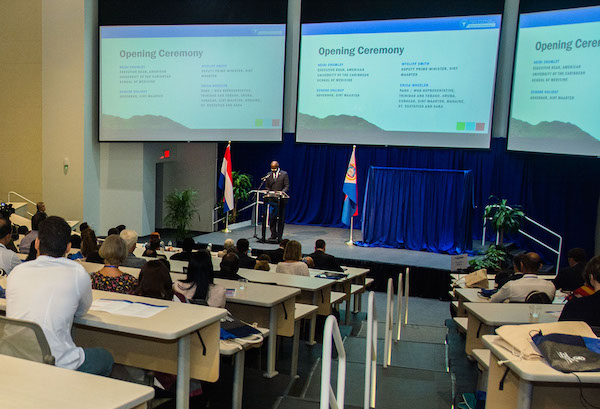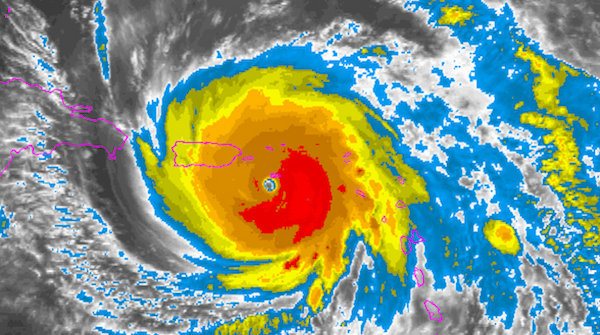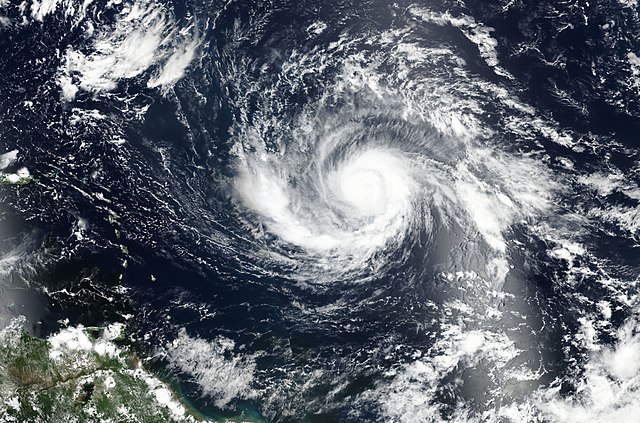 One of the most interesting twists resulting from Hurricane Maria striking Puerto Rico was Elon Musk's offer that Tesla could help Puerto Rico solve its energy crisis, with a long-term, 21st century fix. After all, its electrical grid was devastated, with almost all the power wiped out. It didn't help that even prior to this disaster its system was antiquated and badly in need of repairs. It is telling that we don't have similar offers to rebuild the Puerto Rico's health care system, which is similarly devastated. Or, for that matter, our system, which is its own kind of disaster. Mr. Musk was asked on Twitter if Tesla could help Puerto Rico using solar and battery power, and he responded in the affirmative, saying it had done so on smaller islands but faced no scalablity issues...
One of the most interesting twists resulting from Hurricane Maria striking Puerto Rico was Elon Musk's offer that Tesla could help Puerto Rico solve its energy crisis, with a long-term, 21st century fix. After all, its electrical grid was devastated, with almost all the power wiped out. It didn't help that even prior to this disaster its system was antiquated and badly in need of repairs. It is telling that we don't have similar offers to rebuild the Puerto Rico's health care system, which is similarly devastated. Or, for that matter, our system, which is its own kind of disaster. Mr. Musk was asked on Twitter if Tesla could help Puerto Rico using solar and battery power, and he responded in the affirmative, saying it had done so on smaller islands but faced no scalablity issues...
Puerto Rico
See the following -
2019 International Conference on Disaster Medicine and Hurricane Resiliency Draws Hundreds
 More than 280 healthcare professionals, emergency preparedness experts, and government leaders gathered on campus March 8-11 with the goal of uniting their collective experience and expertise to increase their communities’ ability to manage hurricanes and other disasters. Attendees represented 12 countries, including 9 Caribbean islands, and a multitude of backgrounds in disaster preparedness and response, including disaster medicine and veterinary medicine, nursing, hospital administration, mental health, telehealth, EMS and first responders, disaster recovery and humanitarian assistance, medical education, and more.
More than 280 healthcare professionals, emergency preparedness experts, and government leaders gathered on campus March 8-11 with the goal of uniting their collective experience and expertise to increase their communities’ ability to manage hurricanes and other disasters. Attendees represented 12 countries, including 9 Caribbean islands, and a multitude of backgrounds in disaster preparedness and response, including disaster medicine and veterinary medicine, nursing, hospital administration, mental health, telehealth, EMS and first responders, disaster recovery and humanitarian assistance, medical education, and more.
- Login to post comments
3 Reasons Why the US is Vulnerable to Big Disasters
 During the 2017 disaster season, three severe hurricanes devastated large parts of the U.S. The quick succession of major disasters made it obvious that such large-scale emergencies can be a strain, even in one of the world’s richest countries. As a complex emergency researcher, I investigate why some countries can better withstand and respond to disasters. The factors are many and diverse, but three major ones stand out because they are within the grasp of the federal and local governments: where and how cities grow; how easily households can access critical services during disaster; and the reliability of the supply chains for critical goods. For all three of these factors, the U.S. is heading in the wrong direction. In many ways, Americans are becoming more vulnerable by the day.
During the 2017 disaster season, three severe hurricanes devastated large parts of the U.S. The quick succession of major disasters made it obvious that such large-scale emergencies can be a strain, even in one of the world’s richest countries. As a complex emergency researcher, I investigate why some countries can better withstand and respond to disasters. The factors are many and diverse, but three major ones stand out because they are within the grasp of the federal and local governments: where and how cities grow; how easily households can access critical services during disaster; and the reliability of the supply chains for critical goods. For all three of these factors, the U.S. is heading in the wrong direction. In many ways, Americans are becoming more vulnerable by the day.
- Login to post comments
Amazon, PwC join campaign to bring open-source EMR to Puerto Rico in wake of Hurricane Maria
The National Health IT Collaborative for the Underserved, a public-private partnership founded in 2008, launched the NHIT Care Campaign to bring healthcare resources to Puerto Rico in the aftermath of Hurricane Maria. The two-phase campaign, rolled out with guidance from PwC and other supporting partners, aims to provide emergency medical response tools, supply chain management and technology infrastructure to Puerto Rico's 20 Federally Qualified Health Centers and 85 affiliated health centers.
- Login to post comments
Chikungunya Has Sickened More Than 10,000 In Puerto Rico
It's an unfamiliar tropical virus with an exotic name that causes painful symptoms and has no known treatment or vaccine. It's spreading in the USA...
- Login to post comments
Drones and the Future of Disaster Response
 Four continental states and one U.S. territory took a beating this fall as one natural disaster after another rocked communities in Northern California and along the Gulf Coast, spreading disaster relief resources and personnel thin as federal, state, and local governments scrabbled to address the crises. Wildfires in California's wine country claimed at least 42 lives, 8,400 structures, and 245,000 acres of land in October. Hurricanes Harvey and Irma pummeled Louisiana, Texas, and Florida only to be followed by Hurricane Maria, which slammed Puerto Rico on September 20 and left much of the U.S. territory without communications systems, electricity, clean water, or functioning hospitals....
Four continental states and one U.S. territory took a beating this fall as one natural disaster after another rocked communities in Northern California and along the Gulf Coast, spreading disaster relief resources and personnel thin as federal, state, and local governments scrabbled to address the crises. Wildfires in California's wine country claimed at least 42 lives, 8,400 structures, and 245,000 acres of land in October. Hurricanes Harvey and Irma pummeled Louisiana, Texas, and Florida only to be followed by Hurricane Maria, which slammed Puerto Rico on September 20 and left much of the U.S. territory without communications systems, electricity, clean water, or functioning hospitals....
- Login to post comments
Elon, Do We Have a Disaster for You!
- Login to post comments
FEMA Director Urges Americans to Develop “a true culture of preparedness” But No One Is Listening
It looks like preppers aren’t that crazy after all. FEMA’s new director, Brock Long, has repeatedly said that Americans do not have a “culture of preparedness,” something that is much-needed with the startling uptick in natural disasters. Long has only been the director of FEMA since June 20 of this year and already has had to deal with a historic number of disasters in this short period of time. It appears that Mr. Long has a mindset of self-reliance based on a couple of recent statements he has made to the media, but the MSM doesn’t seem too interested in his ideas about fostering a culture of preparedness, despite the practicality and essential nature of his suggestions...
- Login to post comments
GWU Milken Institute School of Public Health releases report on deaths due to Hurricane Maria in Puerto Rico and outlines steps to protect the most vulnerable communities from disasters
 In an independent report published today, researchers at the George Washington University Milken Institute School of Public Health (GW Milken Institute SPH) estimated there were 2,975 excess deaths in Puerto Rico due to Hurricane Maria from September 2017 through the end of February 2018. The researchers also identified gaps in the death certification and public communication processes and went on to make recommendations that will help prepare Puerto Rico for future hurricanes and other natural disasters.
In an independent report published today, researchers at the George Washington University Milken Institute School of Public Health (GW Milken Institute SPH) estimated there were 2,975 excess deaths in Puerto Rico due to Hurricane Maria from September 2017 through the end of February 2018. The researchers also identified gaps in the death certification and public communication processes and went on to make recommendations that will help prepare Puerto Rico for future hurricanes and other natural disasters.
- Login to post comments
Health Gorilla and the Puerto Rico Department of Health Reach Milestone in Health Information Exchange Network
 Health Gorilla, the largest interoperability provider in Puerto Rico, in conjunction with the Puerto Rico Department of Health (PRDOH), today announced a milestone achievement following the official launch of the Puerto Rico Health Information Exchange (PRHIE) on July 1st. In the one month since go-live, Health Gorilla has successfully connected 25% of Puerto Rico's population to the PRHIE. This innovative project enables healthcare providers to access and share patient medical record data securely and electronically across more than 400 care sites, 4,200 providers, and more than 700,000 patients.
Health Gorilla, the largest interoperability provider in Puerto Rico, in conjunction with the Puerto Rico Department of Health (PRDOH), today announced a milestone achievement following the official launch of the Puerto Rico Health Information Exchange (PRHIE) on July 1st. In the one month since go-live, Health Gorilla has successfully connected 25% of Puerto Rico's population to the PRHIE. This innovative project enables healthcare providers to access and share patient medical record data securely and electronically across more than 400 care sites, 4,200 providers, and more than 700,000 patients.
- Login to post comments
HHS Awards More Than $36 Million for Health Center Adoption of Health Information Technology
 Today, Health and Human Services (HHS) Secretary Sylvia M. Burwell announced more than $36 million in funding for 50 Health Center Controlled Networks (HCCNs) in 41 states and Puerto Rico. This increase in health information technology support will impact over 1,020 participating health center organizations in all 50 states and Puerto Rico. HCCNs improve access to care, enhance quality of care and achieve cost efficiencies through the redesign of practices to integrate services, optimize patient outcomes, or negotiate managed care contracts on behalf of participating health centers...
Today, Health and Human Services (HHS) Secretary Sylvia M. Burwell announced more than $36 million in funding for 50 Health Center Controlled Networks (HCCNs) in 41 states and Puerto Rico. This increase in health information technology support will impact over 1,020 participating health center organizations in all 50 states and Puerto Rico. HCCNs improve access to care, enhance quality of care and achieve cost efficiencies through the redesign of practices to integrate services, optimize patient outcomes, or negotiate managed care contracts on behalf of participating health centers...
- Login to post comments
How an Open Source Campaign is aiding Puerto Rico after Hurricane Maria
On September 20, Hurricane Maria made landfall in Puerto Rico. The storm brought down the island’s electrical grid, leaving individuals without power, running water and medical care. That’s why the National Health IT Collaborative for the Underserved launched the NHIT Care Campaign, an initiative aimed at helping Puerto Rico’s Federally Qualified Health Centers.
- Login to post comments
How Open Government Is Helping With Hurricane Relief in Puerto Rico
 Just weeks after Hurricane Harvey hit Texas, two more "unprecedented" hurricanes made their way to the southeastern United States. Although changes in Hurricane Irma's path spared Florida from the bulk of the damage, both Irma and Maria directly hit Puerto Rico and the U.S. Virgin Islands. Hurricane Maria was particularly devastating for the more than 3.5 million American citizens living in these U.S. Caribbean territories. The CEO of Puerto Rico's sole electric company indicated that the grid had been "basically destroyed." Without electricity, communications were severely limited. In the aftermath of a natural disaster, embracing open government principles—such as open data, collaboration between citizens and government, and transparency—can save lives.
Just weeks after Hurricane Harvey hit Texas, two more "unprecedented" hurricanes made their way to the southeastern United States. Although changes in Hurricane Irma's path spared Florida from the bulk of the damage, both Irma and Maria directly hit Puerto Rico and the U.S. Virgin Islands. Hurricane Maria was particularly devastating for the more than 3.5 million American citizens living in these U.S. Caribbean territories. The CEO of Puerto Rico's sole electric company indicated that the grid had been "basically destroyed." Without electricity, communications were severely limited. In the aftermath of a natural disaster, embracing open government principles—such as open data, collaboration between citizens and government, and transparency—can save lives.
- Login to post comments
Hurricanes Harvey and Irma Draw the Line - Time for the US to Embrace Open Source Emergency and Disaster Response
 For nearly 20 years now the global open source community and applications have been a keystone to disaster relief efforts around the world. The enormous number of disaster relief applications and knowledge that has been developed through all these years, should, and needs to be leveraged in the current crisis. For that reason, Open Health News is starting a series of articles to highlight some of the most important solutions. A substantial portion the open source applications for emergency and disaster response that exist are actually already on the news website in the form of articles and resource pages.
For nearly 20 years now the global open source community and applications have been a keystone to disaster relief efforts around the world. The enormous number of disaster relief applications and knowledge that has been developed through all these years, should, and needs to be leveraged in the current crisis. For that reason, Open Health News is starting a series of articles to highlight some of the most important solutions. A substantial portion the open source applications for emergency and disaster response that exist are actually already on the news website in the form of articles and resource pages.
- The Future Is Open
- Login to post comments
IBM Announces Additional $25 Million Investment to Develop Open Source Tech for Disaster Response
 IBM today announced Code and Response, a new $25 million, four-year deployment initiative to put open source technologies developed as part of coding challenges such as Call for Code in the communities where they are needed most. Code and Response includes resources to build, fortify, test, and implement solutions at scale. The initiative is supported by hundreds of IBMers as part of the IBM Corporate Service Corps, as well as government and NGO partners to put those technologies to work saving lives.
IBM today announced Code and Response, a new $25 million, four-year deployment initiative to put open source technologies developed as part of coding challenges such as Call for Code in the communities where they are needed most. Code and Response includes resources to build, fortify, test, and implement solutions at scale. The initiative is supported by hundreds of IBMers as part of the IBM Corporate Service Corps, as well as government and NGO partners to put those technologies to work saving lives.
- Login to post comments
Moving Counter-Clockwise: Lessons from Hurricanes, Floods and Earthquakes
 The plethora of natural disasters raises all sorts of complicated but expected issues – from discussions of the legitimacy of global warming to the adequacy (or lack thereof) of on the ground relief efforts. One would have thought that post-Katrina, we would be ready, willing and able to provide immediate relief to those in need of disaster relief...despite capacities, we have been stunningly slow in moving these new services into disaster areas. Instead of technology advancing the ball, it is as if we are moving our clocks backwards. Sure, in the absence of cell towers, creative workarounds have been enabled like ATT&T facilitating communications to/from the mainland for its customers.
The plethora of natural disasters raises all sorts of complicated but expected issues – from discussions of the legitimacy of global warming to the adequacy (or lack thereof) of on the ground relief efforts. One would have thought that post-Katrina, we would be ready, willing and able to provide immediate relief to those in need of disaster relief...despite capacities, we have been stunningly slow in moving these new services into disaster areas. Instead of technology advancing the ball, it is as if we are moving our clocks backwards. Sure, in the absence of cell towers, creative workarounds have been enabled like ATT&T facilitating communications to/from the mainland for its customers.
- Login to post comments